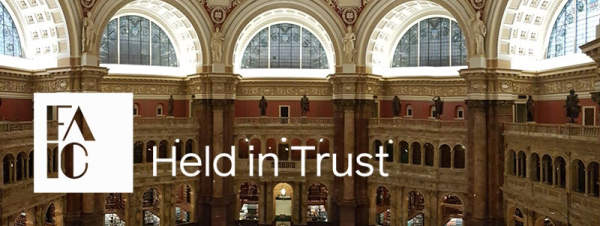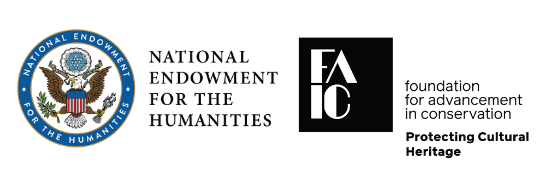National Convening on April 28 to Chart Future of Cultural Heritage Conservation and Preservation Confronting Climate Change and Pressing Issues of Our Time
The Foundation for Advancement in Conservation and the National Endowment for the Humanities to Share Key Findings of Held in Trust: Transforming Cultural Heritage Conservation for a More Resilient Future


Washington, D.C.—On April 28, leaders from the Foundation for Advancement in Conservation (FAIC), the National Endowment for the Humanities (NEH), and organizations across the country will gather for a National Convening in Washington, D.C., to address how the field of cultural heritage conservation and preservation must evolve to tackle the impact of climate change and other pressing issues the country faces today. At the convening, the key findings of a four-year collaboration between the NEH and FAIC, Held in Trust: Transforming Cultural Heritage Conservation for a More Resilient Future, will be introduced and leaders from diverse conservation, community, and cultural organizations will share evocative case studies illustrating the key findings in action.
Held in Trust: Transforming Cultural Heritage Conservation for a More Resilient Future focuses on the intersection of conservation and preservation with critical areas of study, including environmental resilience, science and technology, inclusivity, equity, and collaboration in professional practice, education, philosophy, and ethics. Addressing these challenges before even more irreplaceable sites, objects, and knowledge are lost requires transformative change, including new collaborations with communities and holders of knowledge, and an understanding of environmental perils presented by climate change. This is of vital importance for the field and the public as the preservation of cultural heritage is indispensable to fostering a society where all of humanity is valued and thrives. FAIC and NEH will issue the full report in the summer of 2023, equipping conservators and allied professionals with guidance for implementing the initiative’s key findings.
Lissa Rosenthal-Yoffe, Executive Director of the American Institute for Conservation and the Foundation for Advancement in Conservation, said “Conservation is an inherently hopeful act. In that spirit of optimism, we are committed to building a future that is inclusive and collaborative, sustainable and resilient. The National Convening is an important call to action to all those involved in cultural heritage preservation and conservation to play a role in addressing the impact of the climate crisis on tangible and intangible cultural heritage. People from historically marginalized communities disproportionately experience the impacts of climate change and must be centered in this work. The full Held in Trust report will build out the key findings, providing inspiration and direction to accelerate positive change in a field that, like the culture at large, is undergoing a profound and necessary transformation. I want to thank our partners at the National Endowment for the Humanities for their tremendous support in launching this important endeavor.”
National Endowment of the Humanities Chair Shelly C. Lowe (Navajo) stated, “As Chair of the National Endowment for the Humanities, I would like to express how gratified the Endowment is to support the work of Held in Trust. This work provides insight into how the conservation and preservation community can come together to tackle some of today's biggest challenges: systemic inequality, the effects on our environment due to a changing climate, and threats to democracy worldwide. Held in Trust will continue to have an impact in the years ahead, far beyond the report's release this summer. Together, our organizations envision a future where conservation doesn't merely survive but thrives in a collective commitment to the preservation of cultural heritage and the stories that these objects and places embody.”
KEY FINDINGS OF HELD IN TRUST
A vibrant and resilient future for conservation and preservation depends upon the development of new, highly collaborative paradigms and structures grounded in social justice, equity, and environmental action.
- The extraordinary threat posed by the Climate Crisis requires immediate action by all sectors of society, including professionals at cultural heritage institutions, collections, and sites.
- The activation of DEIA practices requires the shifting of power, culture, ideology, and methodology throughout the field of conservation and preservation.
- Collaboration between communities and practitioners must guide conservation and preservation.
- Both public and private sectors must provide resources for cultural heritage preservation to support agency, attention, and access for communities.
- Sustainability of the field requires enhancement of communication, community engagement, sharing of knowledge and resources, and advocacy.
Held in Trust: Transforming Cultural Heritage Conservation for a More Resilient Future describes challenges and opportunities within each focus area of the report, with strategic goals and benchmarks for implementing the key findings. The full Held in Trust report will be available to download for free this summer at culturalheritage.org/hit. As a direct result of this report, a critically important web-based project called Climate Resilience Resources for Cultural Heritage: An Initiative of Held in Trust will also be available in late 2023, providing interactive climate risk maps, learning modules, and communities of practice to help cultural institutions and heritage sites prepare for and mitigate climate-related environmental hazards.
NATIONAL CONVENING PROGRAM
The National Convening, Held in Trust: Transforming Cultural Heritage Conservation for a More Resilient Future, features leaders whose practices embody the key findings of the initiative. The National Convening will take place April 28, 2023, 1:00 to 5:30 pm ET, at the Library of Congress, Washington, D.C. The event, open by invitation only, can be livestreamed at youtube.com/aiconservation. Seats are reserved for members of the media who prefer to attend the event in person.
For speaker biographies and detailed program information, visit culturalheritage.org/hit.
- Tatiana Ausema and Briann Greenfield, Senior Program Officer, Office of Challenge Programs, and Director, Division of Preservation and Access, National Endowment for the Humanities
- Jeanelle Austin, Executive Director and Co-founder, George Floyd Global Memorial
- Neil Barclay, President and Chief Executive Officer, Charles H. Wright Museum of African American History
- Panel with Cheyenne Caraway, UCLA/Getty Program in the Conservation of Cultural Heritage; Héctor J. Berdecía-Hernández, Director-General, Centro de Conservación y Restauración de Puerto Rico (CENCOR); Dr. Alicia McGeachy, Associate Research Scientist, The Metropolitan Museum of Art; and Moriah Ulinskas, Audiovisual Archivist and PhD Candidate in Public History, University of California, Santa Barbara. Moderator: Anisha Gupta, Conservator and PhD Candidate, University of Delaware
- Suzanne Davis, Associate Curator of Conservation, Kelsey Museum of Archaeology, University of Michigan, AIC Board President
- Pamela Hatchfield, Held in Trust Project Coordinator
- Dr. Carla Hayden, Librarian of Congress
- Brent Leggs, Executive Director, African American Cultural Heritage Action Fund, National Trust for Historic Preservation
- Shelly C. Lowe, Chair, National Endowment for the Humanities
- Lissa Rosenthal-Yoffe, AIC and FAIC Executive Director
- Peter Trippi, FAIC Board President
- Brian Vallo, Former Governor, Pueblo of Acoma
About Held in Trust
Held in Trust is a cooperative agreement between the National Endowment for the Humanities and the Foundation for Advancement in Conservation and is part of the National Endowment for the Humanities’ A More Perfect Union initiative. Any views, conclusions, or recommendations expressed in project materials and findings do not necessarily represent those of the National Endowment for the Humanities.
About The Foundation for Advancement in Conservation (FAIC)
The Foundation for Advancement in Conservation (FAIC) supports conservation education, research, and outreach activities that increase understanding of our global cultural heritage. Our mission is to save cultural heritage for future generations, protecting it from decay and destruction. We advance research and education, lead treatment and collection care initiatives, and deploy conservation expertise to where it is most urgently needed. Our work empowers conservation professionals, strengthens cultural institutions, and engages stakeholders, including public audiences, as we work together to protect cultural heritage for humanity. Learn more at culturalheritage.org and follow FAIC on Twitter, Instagram, YouTube, and Facebook.
About the National Endowment for the Humanities (NEH)
Created in 1965 as an independent federal agency, the National Endowment for the Humanities supports research and learning in history, literature, philosophy, and other areas of the humanities by funding selected, peer-reviewed proposals from around the nation. Additional information about the National Endowment for the Humanities and its grant programs is available at neh.gov.
Media Contacts:
FAIC: Elizabeth Chapman / Hannah Holden, Resnicow and Associates
@email / @email
NEH: media@neh.gov
